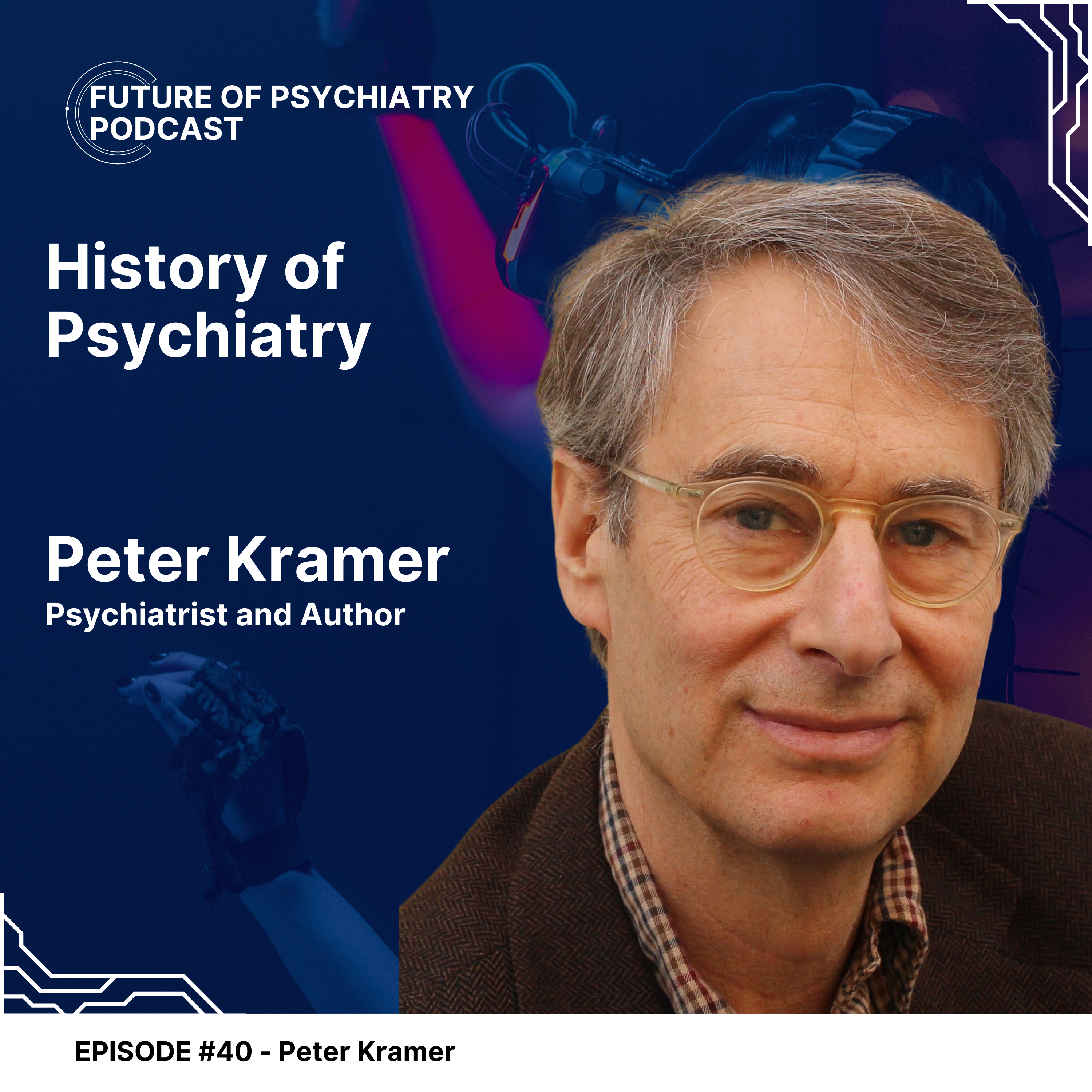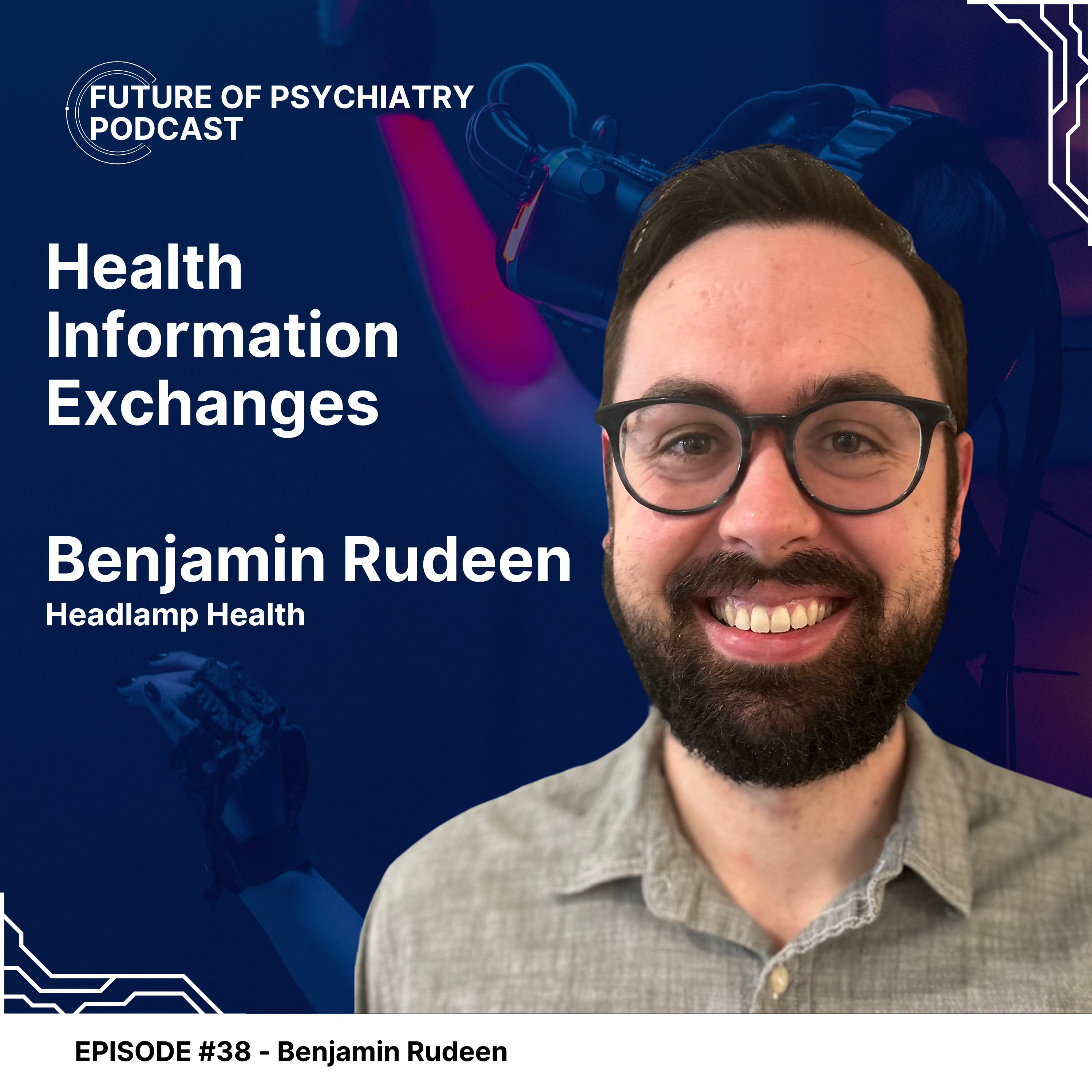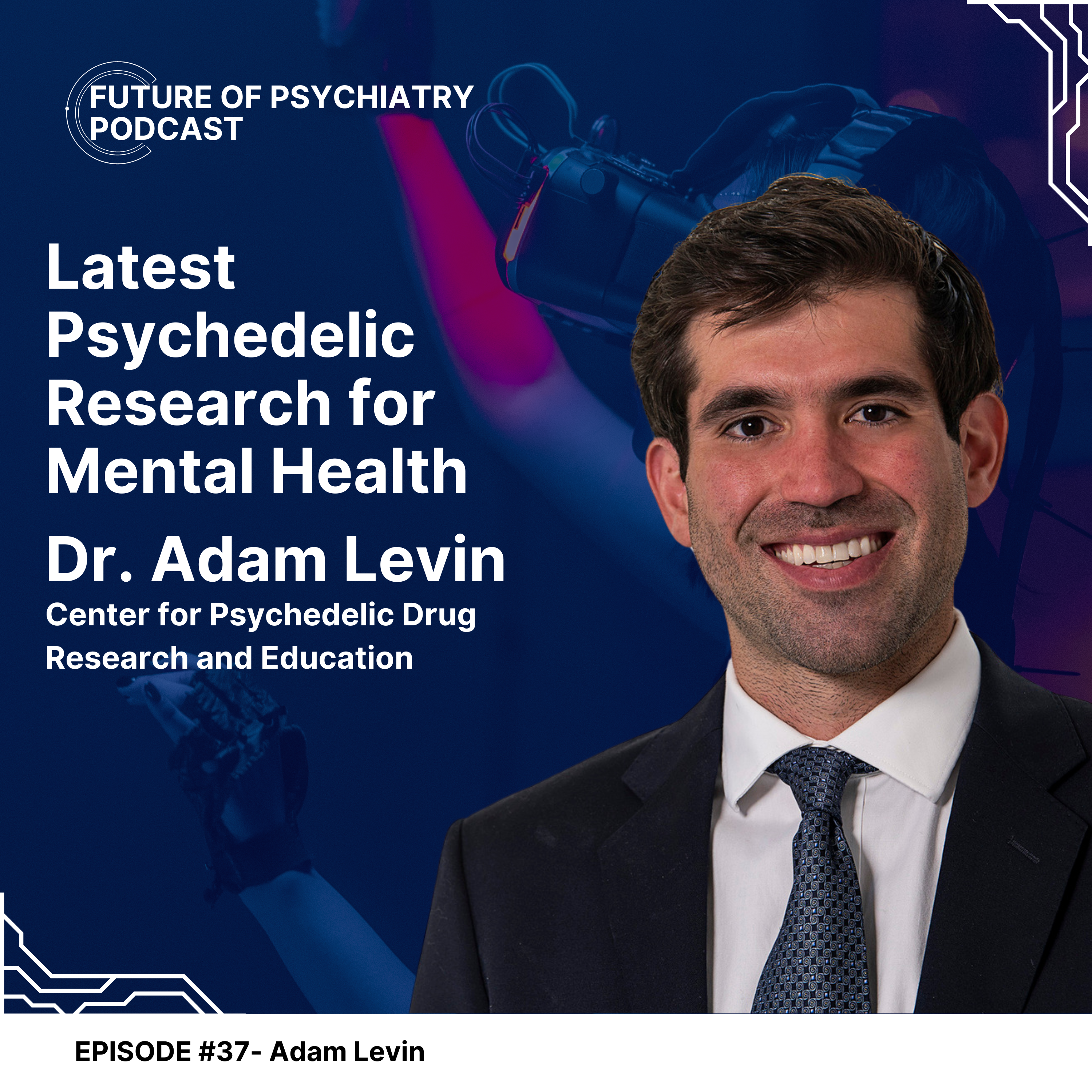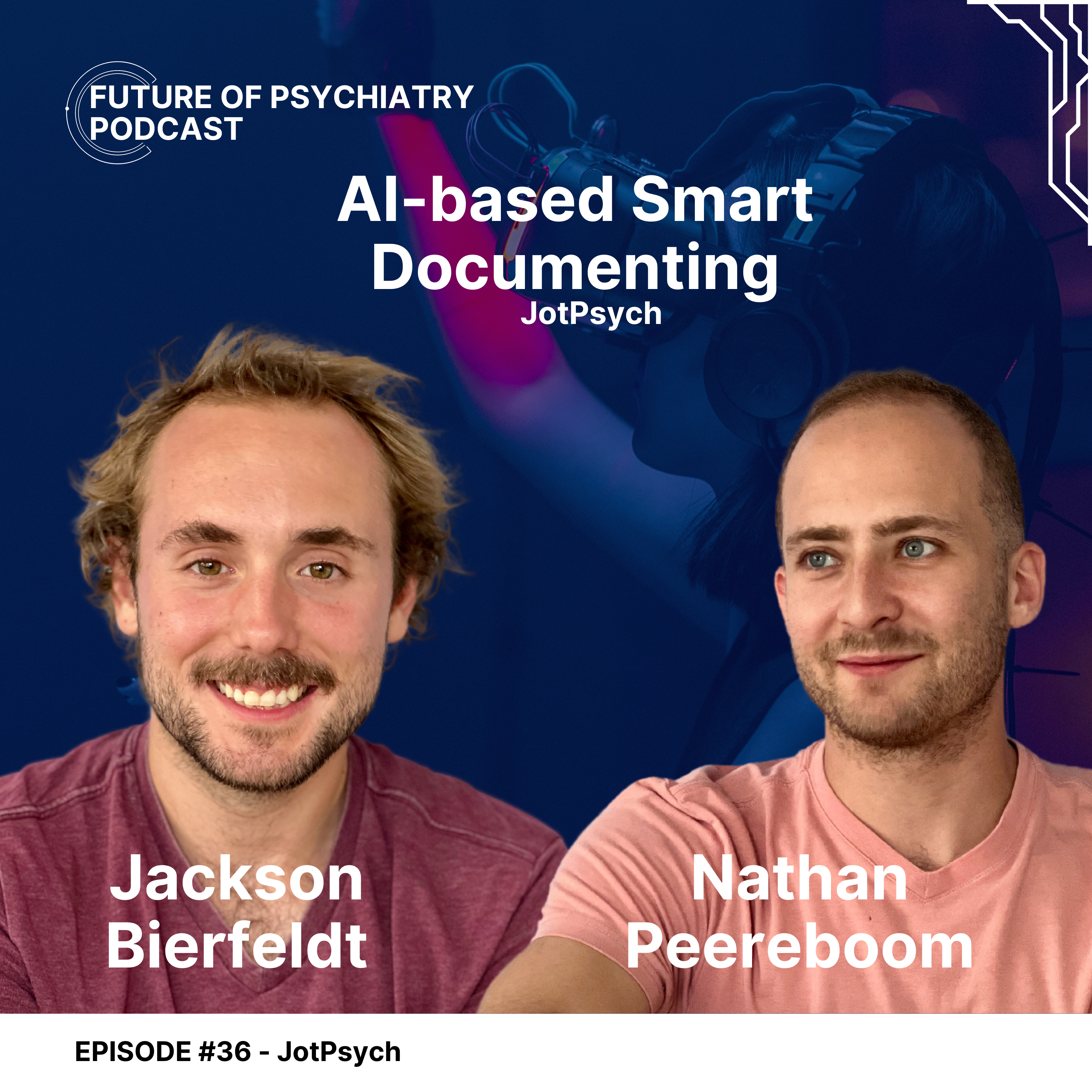#FuturePsychiatryPodcast discusses novel technology and new ideas in the field of mental health. New episodes are released every Wednesday on YouTube, Apple Podcasts, etc.
Episode Sponsors
This episode is brought to you by our sponsors:
Lindy.ai an AI based medical scribe that allows you to customize your notes automatically.
Sign up at: https://www.lindy.ai/bruce for a discount on your first month.
CharmHealth EHR system is an easy to use EHR with clear transparent pricing, pay as you go accounts with no contracts, very easy to onboard, and comes with chock-full of features.
Sign up today for free: https://ehr2.charmtracker.com/ehr/ehrSignup.sas?referer=Referred-by-Dr.Bruce-Bassi
Summary
Exploring personalized treatment through predictive diagnostics and genetics, precision psychiatry aims to optimize outcomes. Innovative antidepressants and AI-driven diagnostics offer promise in revolutionizing mental health care despite challenges.
Chapters / Key Moments
00:00 Intro
00:39 HMNC Brain Health’s Revolutionary Approach
01:38 Precision Psychiatry with AI Tools
04:12 Developing Novel Antidepressants
08:05 The Challenge of Treatment-Resistant Depression
09:58 Ketamine for Treatment Resistant Depression
15:10 Harnessing AI for Predictive Diagnostics in Psychiatry
17:19 The Future of HMNC and Precision Psychiatry
A Glimpse into the Future
In a dynamic discussion, industry experts shared insights into the cutting-edge advancements shaping the future of mental health care. From precision medicine to innovative therapies, the conversation illuminated the transformative potential of emerging technologies in psychiatry.
Precision Psychiatry: Personalized Approaches to Treatment
The conversation delved into the concept of precision psychiatry, highlighting its promise in tailoring treatment plans to individual patients. By leveraging predictive diagnostics and genetic markers, practitioners can now deliver more targeted interventions, optimizing outcomes for those struggling with mental health disorders. This personalized approach not only enhances efficacy but also reduces the burden of trial-and-error treatments, ultimately improving patient well-being.
Innovative Therapies: Rethinking Antidepressant Solutions
Experts discussed the development of novel antidepressants with unique mechanisms of action, offering hope for individuals with treatment-resistant depression. By exploring compounds that target specific biological pathways, such as the HPA axis, researchers aim to provide alternative treatment options for those who have not responded to traditional therapies. Additionally, the exploration of ketamine, particularly in new delivery formats, signals a shift towards more accessible and effective solutions for depression management.
Artificial Intelligence: Revolutionizing Diagnostic Processes
The integration of artificial intelligence (AI) in psychiatry emerged as a key theme, with experts emphasizing its role in predictive diagnostics and treatment optimization. Through advanced data analysis and pattern recognition, AI algorithms can identify crucial biomarkers and predict patient responses to interventions. This transformative technology not only streamlines diagnostic processes but also empowers clinicians to make data-driven decisions, ultimately enhancing the quality of care delivered to individuals with mental health disorders.
Challenges and Opportunities: Navigating the Path Forward
Despite the promise of these advancements, experts acknowledged the challenges ahead, including shifting traditional mindsets in psychiatry and addressing regulatory and funding hurdles. However, they remained optimistic about the opportunities to revolutionize mental health care through collaboration, innovation, and a commitment to patient-centric approaches. As the field continues to evolve, embracing these challenges and opportunities will be essential in realizing the full potential of precision psychiatry and improving outcomes for individuals worldwide.
Conclusion: Charting a Course for Progress
In conclusion, the podcast discussion provided a captivating glimpse into the future of mental health care, showcasing the transformative potential of precision medicine, innovative therapies, and artificial intelligence. With a focus on personalized approaches and cutting-edge technologies, the industry is poised to revolutionize how we diagnose and treat mental health disorders. As we navigate the challenges and opportunities ahead, collaboration and innovation will be key in unlocking a brighter future for mental health care worldwide.
Resources
Transcript
Hans Eriksson: I think we in psychiatry are At a different stage than, for instance, the colleagues in oncology, which over the years have been quite good at developing, tools that can identify patients that are more likely to respond to a certain intervention.
Hans Eriksson: I think we’re on the brink of entering that phase in psychiatry right now as well. So, the overall intention of doing what we are doing is on one hand to develop novel interventions, novel antidepressants, but do that together with selection tools that will select the patients that are more likely to respond to certain treatments, so we can focus on them, and patients who are not so likely to respond should probably go for some other treatment.
Hans Eriksson: So, it’s about matching the patient with the intervention.
Bruce Bassi: Welcome to the Future of Psychiatry podcast, where we explore novel technology, new innovations in mental health. I’m your host, Dr. Bassi, an addiction physician and biomedical engineer. Today we are with Hans Eriksson, who is the chief medical officer of HMNC Brain Health, and we’re going to talk about the company’s precision approach to psychiatry using predictive diagnostics. HMNC is a company that uses artificial intelligence and new genetic advances to create more effective and personalized treatment plans. Their focus is mainly on treatment resistant depression and major depressive disorder. They are the first and only company with this approach in mental health care, providing patients with targeted, personalized therapies that are powered by predictive diagnostics. They developed a patented genetic test such as biomarker test ABCB1, already on the market, which facilitates the selection of the most suitable antidepressants for the patients. Welcome Dr. Erickson.
Hans Eriksson: Thank you so much. I’m happy to be here.
Bruce Bassi: So this on paper sounds incredible. can you tell us a little bit more about what you all are doing with precision psychiatry
Bruce Bassi: and what that means?
Hans Eriksson: Yeah, I’m a clinical psychiatrist myself, and I’ve always been stunned by the, approach that we generally apply in psychiatry, then we have patients coming in with quite diverse symptomatologist, but they are still diagnosed as having Hepatitis B. For instance, major depressive disorder, and then we don’t have very much guidance about what treatments to use.
Hans Eriksson: I mean, there is an abundance of antidepressants out there and also other, therapies for depression, but there is no real guidance. And typically, most clinicians start with a standard antidepressant if they select to go for the antidepressant route. And if that doesn’t work, they go to the next drug.
Hans Eriksson: So it’s sort of a trial and error approach in the treatment. And here, I think we in psychiatry are At a different stage than, for instance, the colleagues in oncology, which over the years have been quite good at developing, tools that can identify patients that are more likely to respond to a certain intervention.
Hans Eriksson: I think we’re on the brink of entering that phase in psychiatry right now as well. So, the overall intention of doing what we are doing is on one hand to develop novel interventions, novel antidepressants, but do that together with selection tools that will select the patients that are more likely to respond to certain treatments, so we can focus on them, and patients who are not so likely to respond should probably go for some other treatment.
Hans Eriksson: So, it’s about matching the patient with the intervention.
Bruce Bassi: Gotcha. And in terms of selecting or recommending the most appropriate antidepressants, are we there yet? Because that, to most psychiatrists, sounds like the holy grail is to ask the question, you know, what should my patient be on first? Gotcha.
Hans Eriksson: when it comes to the currently existing antidepressants, and I think when clinicians are making Selections of antidepressants for their patients, it’s probably more driven by characteristic side effect profile of a compound. So let’s say we have a patient who is agitated the depression, physician might select or prescribe a somewhat sedating antidepressant.
Hans Eriksson: But on the efficacy side, there is not so much we can go by. So it’s more about going the tried and trusted drugs that work most of the times, but not all of the times.
Bruce Bassi: Tell me about biomarker test ABCB1. What does that tell us when we do it?
Hans Eriksson: This is actually a test is aiming at, Refining the dosing of the patient because gives information about to what extent a certain antidepressants are passing the blood brain barrier. it will give a hint to the investigator or to the clinician. If you’re not talking about clinical trials, that, maybe the dose should be adjusted upwards or downwards because, it’s one thing to measure.
Hans Eriksson: plasma concentrations of an antidepressant. But what is really important is the concentration in the brain. And we normally are not able to do that. But this test gives us an information about to what extent the antidepressant is likely to pass the blood brain barrier.
Bruce Bassi: Interesting.
Bruce Bassi: And in terms of the novel antidepressants that you’re developing or your team is developing, tell me about what the mechanism of action is for those and why you decided to focus on that.
Hans Eriksson: so our company’s history goes back to decades of research the field of stress related depression. human body has mechanism for the brain. to control the production of the stress hormone cortisol from the adrenals. So it’s a series of hormonal signals starting in the hypothalamus, going down and eventually leading to cortisol production a response to a stress.
Hans Eriksson: has been known for quite some time that this delicate system is, disturbed in many depressed individuals. So about. A third of depressed individuals seem to have a hyperactivity in this system, so it’s a sort of an overdrive, and it’s not sensitive to normal feedback mechanisms, so you could say that some depressed individuals are in a state of increased stress, and it’s hard to tell which is the hen and which is the egg, if it’s the depression that causes the stress, or if it’s the stress that causes the depression, but the link is strong, and this has been an active field of research, Thank you very much.
Hans Eriksson: For many years, several compounds have been tested, but none has reached patients,
Bruce Bassi: is there
Bruce Bassi: clinical correlate to somebody who has a dysfunction in their HPA axis? Like, is there a clinical picture that, a clinician could be looking out for to decide, Hey, I think there’s maybe a dysfunction in this area that we need to test for to confirm? Yeah.
Hans Eriksson: think originally there were ideas about that. is one physiological test, a challenge test called the DEX CRH test, which can identify individuals that are. hyperactivity of the HPA axis and for some time it was thought that it could be linked to certain clinical presentations like depression, which is perhaps the most severe form of depression, but it has not really been possible to over time that that relationship.
Hans Eriksson: unfortunately it is not As easy as we clinicians like it to be to say that you have these symptoms and therefore you should have this medicine.
Bruce Bassi: so say the HPA axis is dysfunctional or dysregulated in some way. What does medicine do that you are describing or developing? And can you just put that in simplistic terms? Is it going to basically downregulate that axis?
Hans Eriksson: Yeah. Yes. So we actually have two different medicines in development, they’re both active on the HPA axis centrally. one is a. A blocker of vasopressin at the Vasopressin V one B receptor, and the other one is a blocker of another hormone called CRH at the, uh, CRH one receptor. and both these receptors are involved in the activity of the HPA axis.
Hans Eriksson: So by blocking these receptors, we have a tool to calm down this hyperactive system.
Bruce Bassi: Gotcha.
Bruce Bassi: For the selection criteria for the patients who using to target this medication with, is it mainly treatment resistant depression patients who have already failed other medications, and why is that?
Hans Eriksson: Right now we are actually aiming for a broader depressed population, major depressive disorder. It may be that practically that the medications will be more used for treatment resistant depression, but the programs are being conducted broad, more general depressed population. We have another program that is focused more the treatment resistant depression.
Bruce Bassi: and how have outcomes improved in your trials that you’ve done where you are taking this approach? Like, how much better is this approach than the conventional therapies?
Hans Eriksson: I mean, that is what we currently exploring. And give an example from one of the leading programs we are having, where we are using a vasopressin B1B inhibitor. This is a compound that actually was in clinical development about 15 years ago with a large pharma company. was explored both for depression and generalized anxiety disorder, which is a somewhat related condition.
Hans Eriksson: company did three large studies and in one of the depression studies, the compound, demonstrated efficacy. It met the primary efficacy end point. So we know that the compound has antidepressant properties, but the efficacy was. Only on par with that of a standard antidepressant, the compound was not developed further.
Hans Eriksson: We believe that the broad population was perhaps consisting of several subsets patient groups, and that there was one patient group the hyperactivity. of the HPA axis that was driving the overall results. So our ambition is now to identify that subset of individuals and focus the treatment there.
Hans Eriksson: And in that population, we would then expect better efficacy than what you get with the standard antidepressant.
Bruce Bassi: that’s great. It sounds like you took those results and use them to your advantage, even though there was originally no differentiator from the original comparator. it seems like you use
Bruce Bassi: that to, do the next
Bruce Bassi: phase of the study.
Hans Eriksson: Yeah.
Bruce Bassi: And why the focus in your company, on treatment resistant depression?
Hans Eriksson: For treatment resistant depression, we are developing another compound, ketamine, which is already to some extent used clinically. And there is also version of ketamine with the S enantiomer that is approved. As a nasal spray for depression. So this is very well established treatment for depression today.
Hans Eriksson: Even though ketamine started its life a powerful anesthetic.
Hans Eriksson: Drawback with based compounds so far has been that efficacy seems to come together. With a certain characteristic side effects, the most well known, I think, is dissociative experience, which is an almost out of body experience with almost psychotic characteristics, which many, many persons experience as unpleasant.
Hans Eriksson: And, during that period, you can also perhaps do things that dangerous. So for that reason, These kinds of treatments are currently given under medical supervision and for the approved nasal spray, you shouldn’t drive a car until the following day. So even though the medication is powerful, robust efficacy, early onset of effect, the uptake has been a bit limited because of these concerns.
Hans Eriksson: So what we are doing here is that we are developing a novel formulation of ketamine. a tablet, an oral formulation, but with a very slow release. And the slow release leads to, the peak concentration of the active. parent substance, ketamine becomes much lower than what we get, for instance, intravenous treatment, and since ketamine acts on the NMDA receptor and causes these unwanted side effects, we are thereby able to drastically reduce the incidence of dissociation and also blood pressure increase have found a way to Come around the, negative, effects of ketamine, but we have been able to retain the antidepressant efficacy because, we had a phase two study reading out last year, where we could see, a very rapid onset of effect reaching significance within four days, this benefit without, these side effects, and we think this has to do with the fact that. When ketamine is metabolized, it generates downstream metabolites, nor ketamine and hydroxy nor ketamine. And these compounds have been implicated as being antidepressant. So our hypothesis is that the ketamine antidepressant efficacy may, to a large extent, be driven by the metabolites.
Hans Eriksson: we can see, an effect in the clinical trials and the very low concentration of ketamine is beneficial because it does not, elicit these dissociative side effects. So it seems as if we’ve been able to find a better balance between benefit and risk. With our formulation that what has been possible with other formulations
Bruce Bassi: Would it be taken on a daily basis for an extended period of time, like, we think of typical antidepressants are taken, or would it just be for a short burst of five days or, or so?
Hans Eriksson: our program so far, we have used daily dosing for up to three weeks and the medication has been taken at home as well without supervision, without any problems being reported. We believe that going forward, we could go down to a less frequent dosing. So for instance, the approved nasal spray is given no more often than two times per week and over time, even less frequently.
Hans Eriksson: we believe that an intermittent dosing perhaps is, the, best, approach going forward.
Bruce Bassi: so this is only for people who have failed other medications. why is that? why use it for those individuals rather than somebody who has their first episode of depression?
Hans Eriksson: I think it’s a good question. I think we have chosen to start in the treatment resistant depression territory, the least because of the very high unmet medical need there. seen how use both of intravenous ketamine, which is then Not FDA approved yet. And, the approved, nasal spray has really been useful in these populations.
Hans Eriksson: I also think that, given the, risk of dissociative experiences, previous developments have been aiming for more severe, harder to treat part of the population where, the risk of dissociation could be justified. But we believe that if we can really minimize this risk, would probably be possible to consider an extended development program in indications that go beyond TRD.
Hans Eriksson: But it’s very important that this is in the form of a regular, formally correct approved development process. So we are starting now in the TRD end.
Bruce Bassi: Let’s switch gears a little bit to artificial intelligence. And in what ways is HMNC using AI?
Hans Eriksson: have been using AI to generate the companion diagnostic tests that identify the patients. essentially we have done is to combine approach where we selected candidate genes in one companion diagnostics. We have also used information from This physiological challenge test, the dex CRH test, we have been feeding them into our system.
Hans Eriksson: And then we are using an AI approach to identify combinations that signal tendency to these particular interventions. these calculations are large and so complex that they cannot really be done. any other way except by using an AI approach.
Bruce Bassi: And what does that tell you when you apply AI to that data set? Like which snips are more, targetable?
Hans Eriksson: it’s a combination of, understanding SNPs that could be, sitting in candidate genes that are of interest, but it’s also an agnostic approach where the system also finds additional SNPs that could be informative and tries to build, an algorithm that tells us which SNP combinations, are most likely to predict, response, to a certain intervention.
Bruce Bassi: so we talked about a number of different programs that HMNC is working on, which are the closest to market and which are you most excited about?
Hans Eriksson: I think I’m pretty excited about them all. think the companion diagnostic guided programs are in a way. Very novel and to some extent, our, flagship programs because really, boots on the ground attempt to, include, companion diagnostic in the selection of a novel treatment.
Hans Eriksson: but the most advanced program in terms of time to the market is our program with the prolonged release oral ketamine that we are developing in a joint venture the Swiss company. Here we are now, have completed two phase two trials and we are ready to step into the later development phases.
Hans Eriksson: for the vasopressin V1B blocker, we are currently undertaking a large phase two trial in eight countries in Europe that is almost halfway through so that this is a trial that will test both the compound, vasopressin blocker and the prototype companion diagnostic.
Hans Eriksson: then we are aiming at entering phase two with the receptor blocker later this year. So they are slightly staggered, but all are well on their way into the later development phases.
Bruce Bassi: If a clinician who is listening is interested in these opportunities or wanting to Follow along or get more involved. what might they do do so?
Hans Eriksson: I would suggest to follow what we are We right now planning for future clinical trials all our three programs. And depending on where these trials will be conducted, there may be an opportunity. For investigators and patients, of course, participate, in trials, but that, is something that, still is, bit in the future because we already studies ongoing, but, when there will be news.
Hans Eriksson: Studies coming out. there may be possibilities.
Bruce Bassi: Awesome. what challenges do you foresee in the future other than the typical ones related to funding and enrollment and things of that nature?
Hans Eriksson: I think for the companion diagnostic guided programs, I, think it’s, about changing the mindset. we as psychiatrists are not used to using tools to be guided about what treatment could be the best.
Hans Eriksson: it’s to some extent change the way the considerations before start of a treatment are made.
Hans Eriksson: at what point in time should the patient be tested? you could say that, it’s obvious that, the earlier you test, the earlier the patient has the possibility to get the right medication. but also how do you convince clinician who is used to start his standard?
Hans Eriksson: Depressed patient, if you use that term on an initial course with sertraline or recitalopram or some of the other commonly used first time treatments.
Bruce Bassi: hmm. one way I think we can maybe change that mindset is to explain or let it be known that It would save time and money and a lot of suffering in order to a test, earlier
Bruce Bassi: on.
Hans Eriksson: And we also expect that, if our hypothesis hold water, which we hope and think they do. then, the expected improvement in the selected, population will be better than if you just apply the standard antidepressant the full population. so I think this gives us an opportunity to push the, treatment, outcomes and the treatment expectations, some steps forward.
Bruce Bassi: That’s very cool. I think HMNC is, up to a lot of very interesting projects and I fully expect to hear more down the road, after you get through these trials. thank you so much for your time and, insights and all the hard work that you’re doing in this to try to, help a lot of people down the road.
Hans Eriksson: Thank you. It was a pleasure to talk to you.





